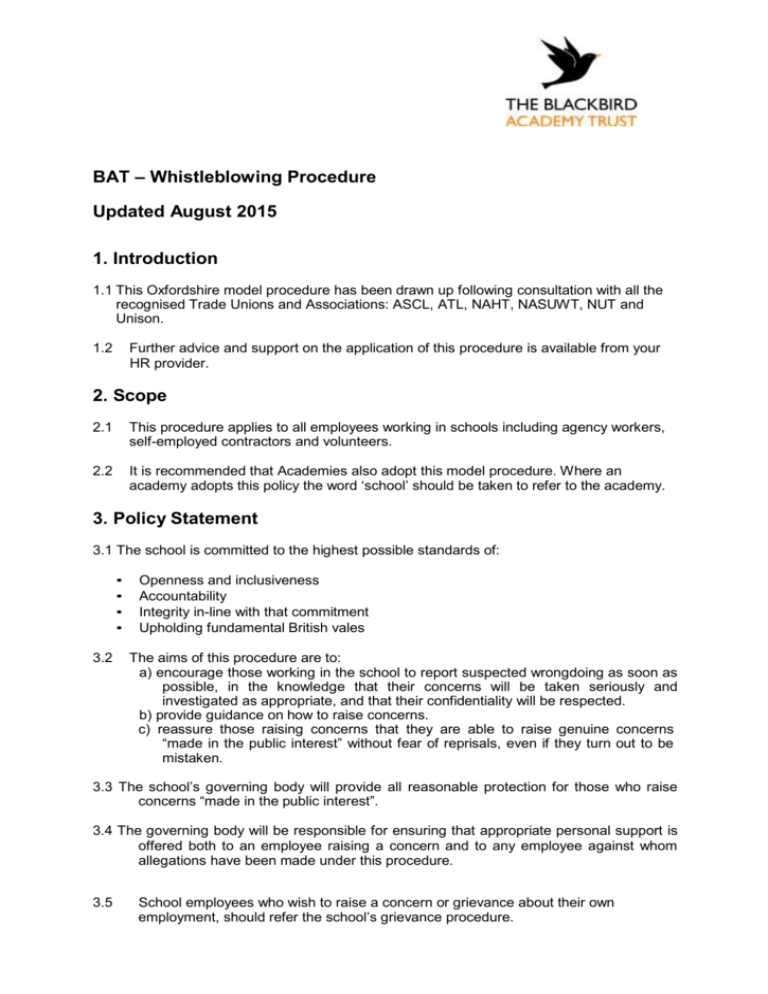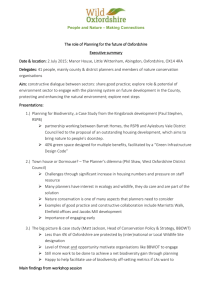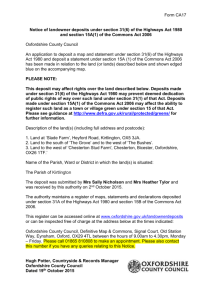Web site: www.oxfordshire.gov.uk
advertisement

BAT – Whistleblowing Procedure
Updated August 2015
1. Introduction
1.1 This Oxfordshire model procedure has been drawn up following consultation with all the
recognised Trade Unions and Associations: ASCL, ATL, NAHT, NASUWT, NUT and
Unison.
1.2
Further advice and support on the application of this procedure is available from your
HR provider.
2. Scope
2.1
This procedure applies to all employees working in schools including agency workers,
self-employed contractors and volunteers.
2.2
It is recommended that Academies also adopt this model procedure. Where an
academy adopts this policy the word ‘school’ should be taken to refer to the academy.
3. Policy Statement
3.1 The school is committed to the highest possible standards of:
•
•
•
•
3.2
Openness and inclusiveness
Accountability
Integrity in-line with that commitment
Upholding fundamental British vales
The aims of this procedure are to:
a) encourage those working in the school to report suspected wrongdoing as soon as
possible, in the knowledge that their concerns will be taken seriously and
investigated as appropriate, and that their confidentiality will be respected.
b) provide guidance on how to raise concerns.
c) reassure those raising concerns that they are able to raise genuine concerns
“made in the public interest” without fear of reprisals, even if they turn out to be
mistaken.
3.3 The school’s governing body will provide all reasonable protection for those who raise
concerns “made in the public interest”.
3.4 The governing body will be responsible for ensuring that appropriate personal support is
offered both to an employee raising a concern and to any employee against whom
allegations have been made under this procedure.
3.5
School employees who wish to raise a concern or grievance about their own
employment, should refer the school’s grievance procedure.
4. What is 'Whistleblowing'?
4.1
'Whistleblowing' is defined as 'raising concerns about misconduct within an
organisation or within an independent structure associated with it' (Nolan Committee
on Standards in Public Life). In the legislation it is called a protected disclosure. The
Public Interest Disclosure Act 1998 (PIDA 1988) protects employees from suffering a
detriment in their employment or being dismissed by their employer if they make
disclosures in accordance with the legislation.
4.2
An employee has certain common law confidentiality obligations to their employer.
However, in a limited set of circumstances whistleblowing may override these
obligations if an employee reveals information about their employment or the work of
the School. This guidance sets out the circumstances under which these disclosures
may lawfully be made
4.3
A concern must relate to something which:
a) is a breach of the school's policies; or
b) falls below established standards or practice; or
c) amounts to improper conduct, including something that may be:
•
•
•
•
•
•
•
•
•
•
•
a breach of the law
a failure to comply with a legal obligation
a possible miscarriage of justice
a Health & Safety risk
damaging the environment
misuse of public money
corruption or unethical conduct
abuse of pupils, students or other users, including undermining of
fundamental British values or promoting radical and extremist views
deliberate concealment of any of these matters
any other substantial and relevant concern
breach of the teachers standards
4.4.
These issues could have arisen in the past, be currently happening or likely to
happen in the future. The law does not protect an employee who would be breaking
the law in making the disclosure.
4.5
If you have a serious concern it should be reported using the following procedure.
5. How to Raise a Concern ('Whistleblowing')
5.1
All concerns will be treated sensitively and with due regard to confidentiality and
where possible every effort will be made to protect your identity if you so wish.
Nevertheless, this information will need to be passed on to those with a legitimate
need to have this information and it may be necessary for you to provide a written
statement or act as a witness in any subsequent disciplinary proceedings or enquiry.
This
will
always
be
discussed
with
you
first.
5.2
Where concerns are expressed anonymously the Headteacher in consultation with
Chair of Governors will decide how to proceed. An investigation may be carried out,
depending on the nature of the allegations and the evidence/information presented.
6. Step 1
6.1
If you wish to raise a concern you should normally raise it with your line manager.
This can be in person or in writing.
6.2
The school recognises that sometimes it may be inappropriate for you to approach
your line manager with your concern. In these circumstances, a number of
alternatives are available depending on the nature of your concern. You can contact
any of the following:
•
•
•
•
•
Headteacher
Chair of Governors/Academy Trust
Schools’ HR Team
Oxfordshire County Council, Director of Children, Education and Families
Trade union
6.3
Although you are not expected to prove beyond doubt the truth of your concerns, you
will need to demonstrate that you have sufficient evidence or other reasonable
grounds to raise them.
6.4
You may wish to obtain advice from a trade union representative or a colleague. You
may choose to be represented by a trade union representative or colleague at any
meetings that are required.
7. Step 2
7.1
The person with whom you have raised your concern will acknowledge its receipt as
soon as possible and will write to you within 10 days to let you know how your
concern will be dealt with.
7.2
The information you can then expect to receive is:
• an indication of how the concern will be dealt with
• an estimate of how long it will take to provide a final response
• whether any initial enquiries have been made
• whether further investigations will take place, and if not why not
• information about support available for you
7.3
The person with whom you have raised your concern will at the same time notify
Schools’ HR that a whistleblowing allegation has been made.
7.4
Advice on dealing with concerns is available from the Schools’ HR team, the
council’s Legal or Financial Services.
8. Step 3
8.1
Initial enquiries will be made to decide whether an investigation is appropriate. Where
an investigation is necessary, it may take the form of one or more of the following:
•
•
•
•
an internal investigation by the Headteacher or a governor, which may, for
example, take the form of a disciplinary investigation
an investigation by the Internal Audit Service
a referral to the Police
the setting up of an external independent inquiry
9. Step 4
9.1
You will be informed of the outcome of any investigation, in writing, and/or of any
action taken, subject to the constraints of confidentiality and the law.
9.2
If you do not feel your concern has been addressed adequately you may raise it with
an independent body such as one of the following as appropriate:
•
•
•
•
•
•
•
•
your trade union
the Citizens Advice Bureau
a relevant professional body or regulatory organisation
a relevant voluntary organisation
the Police
the Local Government Ombudsman
Oxfordshire Racial Equality Council
Equality and Human Rights Commission
(See Annex 2 for further details).
9.3
You must make a disclosure “in the public interest”; and in the circumstances it must
be reasonable for you to make the disclosure.
9.4
If there is an issue of an exceptionally serious nature which you believe
substantially true, then you may disclose the issue to someone other than
listed in paragraph 9.2. In determining whether it is reasonable for you to have
a disclosure the identity of the person to whom the disclosure is made will be
into account. Disclosures to anyone outside of the recognised bodies specified
may not be protected disclosures under the Act.
9.5
You have a duty to the School not to disclose confidential information. This does not
prevent you from seeking independent advice at any stage or from discussing the
issue with the charity Public Concern at Work on 020 7404 6609 and
www.pcaw.co.uk in accordance with the provisions of the Public Interest Disclosure
Act 1998.
to be
those
made
taken
in 9.2
10. Review and Reporting of the Procedure
10.1
For maintained and voluntary controlled school’s Oxfordshire County Council’s Chief
Executive, as Head of the Paid Service, and the County Solicitor, as the Council's
Monitoring Officer, have overall responsibility for this procedure. School Governing
Bodies are responsible for the management of services and staff within their school.
For voluntary aided and foundation schools the responsibility will lie with the
Governing Body, and for academies with the Academy Trust.
10.1
This procedure has been reviewed with reference to equalities, human rights and
discrimination legislation. Confidential monitoring of the procedures is undertaken in
order to gather data to help establish whether the procedure is operated in a fair and
consistent manner. In undertaking monitoring the School will not identify individuals.
10.2
This procedure will be regularly reviewed by the Monitoring Officer to ensure that it
continues to remain compliant and meets the needs of Schools and those working in
schools.
Responsible Officer: Jill Hudson
Date: 01-09-2015
Review Date: 31-07-16
Contact Details (Oxfordshire County Council)
Your Schools HR Provider
Assistant Chief Executive/Chief
Finance Officer
Tel no: 01865 816399
Email: sue.scane@Oxfordshire.gov.uk
Address: County Hall, New Road, Oxford. 0X1 1TH
Web site: www.oxfordshire.gov.uk
Chief Internal Auditor
Tel no: 01865 323875
Email: ian.dyson@oxfordshire.gov.uk
Address: County Hall, New Road, Oxford. OX1 1TH
Web site: www.oxfordshire.gov.uk
Tel no: 01865 323907
Email: peter.clark@oxfordshire.gov.uk
Address: County Hall, New Road, Oxford. OX1 1ND
Web site: www.oxfordshire.gov.uk
County Solicitor/Monitoring
Officer
Head of Human Resources
Tel no. 01865 815191
Email: steve.munn@oxfordshire.gov.uk
Address: County Hall, New Road, Oxford. OX1 1ND
Web site: www.oxfordshire.gov.uk
Chief Executive
Tel no: 01865 815330
Email: Joanna.simons@oxfordshire.gov.uk
Address: County Hall, New Road, Oxford. OX1 1ND
Web site: www.oxfordshire.gov.uk
Tel/email
Directors
Chief Executive’s Office
01865 816399
sue.scane@Oxfordshire.gov.uk
Children, Education & Families
01865 815122
jim.leivers@oxfordshire.gov.uk
Social Services
01865 323574
john.jackson@oxfordshire.gov.uk
Public Health
01865 810163
jonathan.mcwilliam@Oxfordshire.gov.uk
Environment & Economy
01865 815827
huw.jones@oxfordshire.gov.uk
Contact Details (External Organisations)
The Local Government
Ombudsmen
Address: PO Box 4771, Coventry, VC4 0EH
Web: www.lgo.org.uk
Tel no: 0300 061 0614
Equality Advisory Support
Service
Address: FREEPOST Equality Advisory Support
Service FPN4431
Web: http://www.equalityadvisoryservice.com/
Tel no: 0808 800 0082
Oxfordshire Racial equality
Council
Address: 1 Tidmarsh Lane, Oxford, OX1 1PE
Tel no: 01865 815239
The Health and Safety Executive
(Regional Office)
Address: Priestley House, Priestley Road,
Basingstoke, Hampshire, RG24 9NW
Web: www.hse.gov.uk
The Environment Agency (South
East Regional Office)
Address: Kings Meadow House, Kings Meadow Road,
Reading, RG1 8DQ
Web: www.environment-agency.gov.uk
Tel no: 0370 8506506
Citizens Advice Bureau
Please refer to ‘Yellow Pages’ for local information
Police
Please refer to ‘Yellow Pages’ for local information
National College of School
Leadership
Secretary of State for Education





